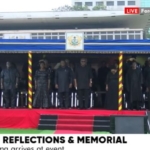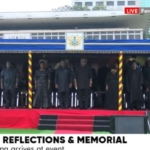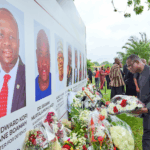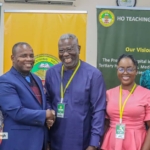
The Evening of Reflections and Memorial, held on Saturday, 9 August 2025, at the Forecourt of the State House, was not simply a ceremony of mourning; it was Ghana’s collective soul-searching.
This profound event has become the national stage for transforming shared grief into a powerful, renewed sense of purpose.
The loss of Defence Minister Dr Edward Omane Boamah, Environment Minister Dr Ibrahim Murtala Mohammed, and six other brave souls in the military helicopter crash has become a catalyst for the nation to reaffirm its commitment to progress.
This analysis is a deeper dive into the emotional, political, and societal echoes of this impactful night, examining how a shared tragedy has been used to bridge political divides and inspire national resolve.
The Human Cost of Service and the Call for Justice
The tributes and interfaith prayers at the memorial painted a compelling portrait of the individuals lost. They were not just names on a casualty list; they were fathers, friends, dedicated public servants, and patriots who, as Presidential Spokesperson Felix Kwakye Ofosu movingly stated, “paid the supreme price” in service to their nation.
The personal anecdotes shared were particularly touching. Madam Laadi Ayii Ayamba, the Member of Parliament (MP) for Pusiga from the National Democratic Congress (NDC), offered a heartfelt tribute to her fellow NDC MP, Dr Ibrahim Murtala Mohammed, recalling his humility and intellectual rigour. She remembered him as a “true Muslim always quoting the Qur’an” and a debater who “would accept whenever he slipped,” revealing a rare and admirable self-awareness.
The inclusion of victims such as former Obuasi East NDC Parliamentary Candidate Samuel Aboagye and NDC Vice Chairman Dr Samuel Sarpong alongside military personnel underscores the non-partisan nature of the sacrifice. This is a powerful testament that the tragedy transcends political allegiances.
It is crucial to remember the dedicated crew members who perished: Squadron Leader Peter Bafemi Anala, Flying Officer Mane-Twum Ampadu, and Sergeant Ernest Addo-Mensah. Their service was a silent, essential part of the mission.
A family member of Sergeant Ernest Addo-Mensah, speaking to a local news outlet, tearfully said: “He was a good man, a family man. He gave his life for this country, and that is all that matters.” This deep personal loss is felt across the country.
Ebo Dadson, a teacher in Accra, said: “I don’t know them personally, but their submissions on issues of national interest make me like them.”
Naa Amerley, a market trader, lamented: “I thought it was a joke until I confirmed it. It’s a big loss to the nation.” These voices represent a national mourning that is both personal and collective.
Adding a layer of complexity to the human tragedy is the urgent call from the Ashanti Regional Coordinating Council for the return of any items from the crash site. The Regional Minister, Dr Frank Amoakohene, appealed to residents of nearby communities to return any parts of the helicopter or personal belongings of the victims. The statement offers a cash reward for voluntary returns by Monday, 11 August, but warns that anyone found with such items after the deadline will be considered a criminal. This appeal highlights a deeply human and unsettling aspect of the disaster: the fine line between opportunism and the need for a thorough investigation to provide closure to the grieving nation.
A Nation’s Unified Response
The official response was a study in national unity. While President Mahama’s speech was a masterclass in empathetic leadership, the opposition New Patriotic Party (NPP) also offered a powerful message of solidarity. In a statement signed by its General Secretary, Justin Frimpong-Kodua, the NPP expressed “profound sadness” and described the deaths as a “national loss”—a sentiment that echoed a rare bipartisan unity.
Ghana’s Chief of Staff, Julius Debrah, delivered a poignant message directly to the bereaved families, assuring them of the nation’s unwavering support. He stated: “To the wives, children, parents, relatives, former colleagues and close comrades of our fallen heroes—know that you are not alone in this tragedy. We stand with you in flesh and in spirit.”
The Ghana Catholic Bishops’ Conference also issued a statement, noting their “shock to lose such brilliant minds all at once.” This cross-political and interfaith support highlights how the tragedy has temporarily suspended partisan rivalry.
The books of condolence opened at key institutions—from the Ministry of Defence to the Ghana Armed Forces Headquarters and even the NDC headquarters—are not just a formality; they are a tangible expression of a nation united in shared sorrow.
The solemnity of the national mourning was further defined by prompt burials for two of the victims. In line with Islamic traditions, Dr Ibrahim Murtala Mohammed and Alhaji Muniru Limuna Mohammed, the Acting Deputy National Security Coordinator, were to be laid to rest on Sunday, 10 August, following Jannaza prayers at the Forecourt of the State House. This immediate action underscores the cultural and religious diversity of the nation and the government’s commitment to respecting different traditions, even amid a national crisis.
A Call to Action from Grief
President John Mahama’s speech went beyond typical political rhetoric. He directly challenged the nation to “turn the grief over the 6 August military helicopter tragedy into a renewed drive for national progress.”
This is a pragmatic, forward-looking message that acknowledges the pain of the present while steering the country towards a more hopeful future. The fact that the victims were on a mission to combat illegal mining (galamsey)—a national crisis with significant environmental and economic implications—provides a powerful, symbolic context to their sacrifice.
Their deaths should, as the President suggested, serve as a reminder of the “significant work still needed to advance the nation.” The call to action extends beyond mourning; it demands a national rededication to solving the very problems these leaders were trying to address.
A Legacy Forges a Stronger Nation
The solemnity of the Evening of Reflections and Memorial, which precedes a state funeral, is now giving way to a lasting legacy. The tragedy has placed a spotlight on the inherent risks faced by those in service to the state, from high-ranking ministers to the dedicated crew members.
This moment presents an opportunity for Ghana to not only mourn its fallen but also to reassess its national priorities and safety protocols.
As Ghanaians collectively grieve, they are also being asked to look inward, to find the strength to move forward. The ultimate testament to the lives of these eight brave souls will be how the nation responds to this challenge.
This tragedy is not just a political event; it is a test of the nation’s resolve and a crucible from which a more unified, determined Ghana may yet emerge.
- President Commissions 36.5 Million Dollars Hospital In The Tain District
- You Will Not Go Free For Killing An Hard Working MP – Akufo-Addo To MP’s Killer
- I Will Lead You To Victory – Ato Forson Assures NDC Supporters
Visit Our Social Media for More




